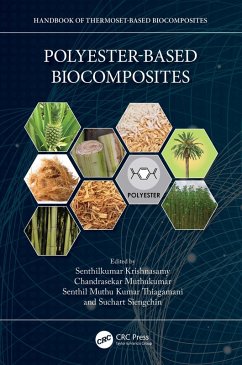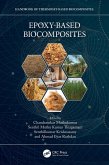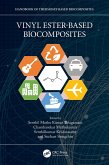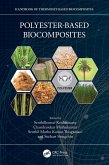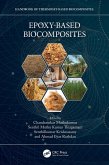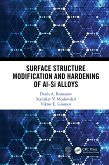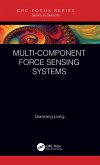Polyester-Based Biocomposites (eBook, PDF)
Redaktion: Krishnasamy, Senthilkumar; Siengchin, Suchart; Muthu Kumar Thiagamani, Senthil; Muthukumar, Chandrasekar
178,95 €
178,95 €
inkl. MwSt.
Sofort per Download lieferbar

89 °P sammeln
178,95 €
Als Download kaufen

178,95 €
inkl. MwSt.
Sofort per Download lieferbar

89 °P sammeln
Jetzt verschenken
Alle Infos zum eBook verschenken
178,95 €
inkl. MwSt.
Sofort per Download lieferbar
Alle Infos zum eBook verschenken

89 °P sammeln
Polyester-Based Biocomposites (eBook, PDF)
Redaktion: Krishnasamy, Senthilkumar; Siengchin, Suchart; Muthu Kumar Thiagamani, Senthil; Muthukumar, Chandrasekar
- Format: PDF
- Merkliste
- Auf die Merkliste
- Bewerten Bewerten
- Teilen
- Produkt teilen
- Produkterinnerung
- Produkterinnerung

Bitte loggen Sie sich zunächst in Ihr Kundenkonto ein oder registrieren Sie sich bei
bücher.de, um das eBook-Abo tolino select nutzen zu können.
Hier können Sie sich einloggen
Hier können Sie sich einloggen
Sie sind bereits eingeloggt. Klicken Sie auf 2. tolino select Abo, um fortzufahren.

Bitte loggen Sie sich zunächst in Ihr Kundenkonto ein oder registrieren Sie sich bei bücher.de, um das eBook-Abo tolino select nutzen zu können.
Polyester-Based Biocomposites highlights the performance of polyester-based biocomposites reinforced with various natural fibres extracted from leaf, stem, fruit bunch, grass, wood material. It also addresses the characteristics of polyester-based biocomposites reinforced with rice husk fillers and various nanoparticles.
- Geräte: PC
- mit Kopierschutz
- eBook Hilfe
Andere Kunden interessierten sich auch für
![Epoxy-Based Biocomposites (eBook, PDF) Epoxy-Based Biocomposites (eBook, PDF)]() Epoxy-Based Biocomposites (eBook, PDF)168,95 €
Epoxy-Based Biocomposites (eBook, PDF)168,95 €![Vinyl Ester-Based Biocomposites (eBook, PDF) Vinyl Ester-Based Biocomposites (eBook, PDF)]() Vinyl Ester-Based Biocomposites (eBook, PDF)168,95 €
Vinyl Ester-Based Biocomposites (eBook, PDF)168,95 €![Polyester-Based Biocomposites (eBook, ePUB) Polyester-Based Biocomposites (eBook, ePUB)]() Polyester-Based Biocomposites (eBook, ePUB)178,95 €
Polyester-Based Biocomposites (eBook, ePUB)178,95 €![Epoxy-Based Biocomposites (eBook, ePUB) Epoxy-Based Biocomposites (eBook, ePUB)]() Epoxy-Based Biocomposites (eBook, ePUB)168,95 €
Epoxy-Based Biocomposites (eBook, ePUB)168,95 €![Surface Structure Modification and Hardening of Al-Si Alloys (eBook, PDF) Surface Structure Modification and Hardening of Al-Si Alloys (eBook, PDF)]() Denis A. RomanovSurface Structure Modification and Hardening of Al-Si Alloys (eBook, PDF)66,95 €
Denis A. RomanovSurface Structure Modification and Hardening of Al-Si Alloys (eBook, PDF)66,95 €![Guidebook to Real Time Electron Dynamics (eBook, PDF) Guidebook to Real Time Electron Dynamics (eBook, PDF)]() Jorge KohanoffGuidebook to Real Time Electron Dynamics (eBook, PDF)52,95 €
Jorge KohanoffGuidebook to Real Time Electron Dynamics (eBook, PDF)52,95 €![Multi-Component Force Sensing Systems (eBook, PDF) Multi-Component Force Sensing Systems (eBook, PDF)]() Qiaokang LiangMulti-Component Force Sensing Systems (eBook, PDF)22,95 €
Qiaokang LiangMulti-Component Force Sensing Systems (eBook, PDF)22,95 €-
-
-
Polyester-Based Biocomposites highlights the performance of polyester-based biocomposites reinforced with various natural fibres extracted from leaf, stem, fruit bunch, grass, wood material. It also addresses the characteristics of polyester-based biocomposites reinforced with rice husk fillers and various nanoparticles.
Dieser Download kann aus rechtlichen Gründen nur mit Rechnungsadresse in A, B, BG, CY, CZ, D, DK, EW, E, FIN, F, GR, HR, H, IRL, I, LT, L, LR, M, NL, PL, P, R, S, SLO, SK ausgeliefert werden.
Produktdetails
- Produktdetails
- Verlag: Taylor & Francis eBooks
- Seitenzahl: 338
- Erscheinungstermin: 29. September 2023
- Englisch
- ISBN-13: 9781000891003
- Artikelnr.: 68874732
- Verlag: Taylor & Francis eBooks
- Seitenzahl: 338
- Erscheinungstermin: 29. September 2023
- Englisch
- ISBN-13: 9781000891003
- Artikelnr.: 68874732
- Herstellerkennzeichnung Die Herstellerinformationen sind derzeit nicht verfügbar.
Dr. Senthilkumar Krishnasamy is a Research Scientist at the Center of Innovation in Design and Engineering for Manufacturing (CoI-DEM), King Mongkut's University of Technology North Bangkok, Thailand. Dr. Senthilkumar Krishnasamy graduated with a bachelor's degree in Mechanical Engineering from Anna University, Chennai, India, in 2005. He then chose to continue his master's studies and was graduated with a Master's degree in CAD/CAM from Anna University, Tirunelveli, in 2009. He has obtained his Ph.D. from the Department of Mechanical Engineering- Kalasalingam University (2016). He had been working in the Department of Mechanical Engineering, Kalasalingam Academy of Research and Education (KARE), India, from 2010 (January) to 2018 (October). He completed his postdoctoral fellowship at Universiti Putra Malaysia, Serdang, Selangor, Malaysia and King Mongkut's University of Technology North Bangkok (KMUTNB) under the research topics of "Experimental investigations on mechanical, morphological, thermal and structural properties of kenaf fibre/mat epoxy composites" and "Sisal composites and Fabrication of Eco-friendly hybrid green composites on tribological properties in a medium-scale application," respectively. His area of research interests includes the modification and treatment of natural fibers, nanocomposites, 3D printing, and hybrid-reinforced polymer composites. He has published research papers in international journals, book chapters and conferences in the field of natural fibre composites. Dr. Chandrasekar Muthukumar is an Assistant Professor in the School of Aeronautical Sciences, Hindustan Institute of Technology & Science, Chennai, India. He graduated with a bachelor's degree in Aeronautical Engineering from Kumaraguru College of Technology, Coimbatore, India. His Master's degree in Aerospace Engineering was from Nanyang Technological University-TUM ASIA, Singapore. He received his PhD in Aerospace Engineering from Universiti Putra Malaysia (UPM), Malaysia. His PhD was funded through the research grant from the Ministry of Education, Malaysia. During his association with the UPM, he has obtained internal research fund from the University worth 16,000 MYR and 20,000 MYR respectively. He has 5 years of teaching and academic research experience. His field of expertise includes Fibre Metal Laminate (FML), natural fibres, bio-composites, aging and their characterization. His publications are based on the fabrication and characterization techniques of Biocomposites, Aging studies in Biocomposites and Creep analysis of Biocomposites. He has authored and co-authored 32 research articles in SCI Journals, 24 book chapters and 5 articles in the conference proceedings. He is a peer reviewer for Journal of Composite Materials, Polymer Composites, Materials Research Express and Journal of Natural fibres. Dr. Senthil Muthu Kumar Thiagamani is an Associate Professor in the Department of Mechanical Engineering at Kalasalingam Academy of Research and Education (KARE), Tamil Nadu, India. He received his Diploma in Mechanical Engineering from the Directorate of Technical Education, Tamil Nadu in the year 2004, obtained his Bachelor of Engineering in Mechanical Engineering from Anna University Chennai in 2007 and Master of Technology in Automotive Engineering from Vellore Institute of Technology, Vellore in 2009. He received his Doctor of Philosophy in Mechanical Engineering (specialized in Biocomposites) from KARE in 2018. He also completed his Postdoctoral Research from the Materials and Production Engineering Department at The Sirindhorn International Thai-German Graduate School of Engineering (TGGS), KMUTNB, Thailand. He started his academic career as Assistant Professor in Mechanical Engineering at KARE in 2010. He has 11 years of teaching and research experience. He is also a visiting researcher at KMUTNB, Thailand. He is a member of international societies such as the Society of Automotive Engineers and the International Association of Advanced Materials. His research interests include biodegradable polymer composites and characterization. He has authored several articles in peer-reviewed international journals, book chapters, and conference proceedings. He has also published edited books in the field of biocomposites. He is also serving as reviewer for various journals and some of them to mention are Journal of Industrial Textiles, Journal of Polymers and the Environment, SN Applied Sciences, Mechanics of Composite Materials, International Journal of Polymer Science etc. Prof. Suchart Siengchin is President of King Mongkut's University of Technology North Bangkok (KMUTNB), Thailand. He received his Dipl.-Ing. in Mechanical Engineering from University of Applied Sciences Giessen/Friedberg, Hessen, Germany in 1999, M.Sc. in Polymer Technology from University of Applied Sciences Aalen, Baden-Wuerttemberg, Germany in 2002, M.Sc. in Material Science at the Erlangen-Nürnberg University, Bayern, Germany in 2004, Doctor of Philosophy in Engineering (Dr.-Ing.) from Institute for Composite Materials, University of Kaiserslautern, Rheinland-Pfalz, Germany in 2008 and Postdoctoral Research from Kaiserslautern University and School of Materials Engineering, Purdue University, USA. In 2016 he received the habilitation at the Chemnitz University in Sachen, Germany. He worked as a Lecturer for the Production and Material Engineering Department at The Sirindhorn International Thai-German Graduate School of Engineering (TGGS), KMUTNB. He has been a full Professor at KMUTNB and became the President of KMUTNB. He won the Outstanding Researcher Award in 2010, 2012 and 2013 at KMUTNB. His research interests in Polymer Processing and Composite Material. He is Editor-in-Chief: KMUTNB International Journal of Applied Science and Technology and the author of more than 150 peer-reviewed Journal Articles. He has participated with presentations in more than 39 International and National Conferences with respect to Materials Science and Engineering topics.
Part I: Characterization with Reinforcements. 1. Polyester Resin and Their
Use as Matrix Material in the Polymer Composites: An Overview. 2. Pineapple
Fibre Reinforced Polyester Composites. 3. Flax Fibre Reinforced Polyester
Composites. 4. Kenaf Fibre Reinforced Polyester Composites. 5. Jute Fibre
Reinforced Polyester Composites. 6. Bamboo Fibre Reinforced Polyester
Composites. 7. Banana Fibre Reinforced Polyester Composites. 8. Polyester
Based Composites Reinforced with Animal Skin and Hides. 9. Sisal Fibre
Reinforced Polyester Composites. 10. Palm Fibre Reinforced Polyester
Composites. 11. Coir Fibre Reinforced Polyester Composites. 12. Wood Fibre
Based Polyester Composites. 13. Polyester Based Composites Reinforced with
Rice Husk Fillers. 14. Polyester Based Bionanocomposites. 15. Natural
Fibre/Polyester-based Hybrid Composites. 16. Thermal Characterization of
Polyester Based Biocomposites. Part II: Engineering Applications. 17.
Polyester Based Biocomposites for Marine Applications. 18. Polyester Based
Biocomposites for Tribological Applications. 19. Polyester Based
Biocomposites for Building and Construction Applications. 20. Polyester
Based Biocomposites for Food Packaging Applications. Part III: Role of
Artificial Intelligence. 21. Prediction of Mechanical Properties of
Biocomposites Through the Artificial Intelligence Approach. 22. Application
of Artificial Intelligence in the Design and Fabrication of Biocomposites.
23. Failure Prediction, Damage Detection and Characterization in
Biocomposites Through Artificial Intelligence. 24. Drilling, Machining, and
Optimization of Their Process Parameters in Biocomposites With Artificial
Intelligence.
Use as Matrix Material in the Polymer Composites: An Overview. 2. Pineapple
Fibre Reinforced Polyester Composites. 3. Flax Fibre Reinforced Polyester
Composites. 4. Kenaf Fibre Reinforced Polyester Composites. 5. Jute Fibre
Reinforced Polyester Composites. 6. Bamboo Fibre Reinforced Polyester
Composites. 7. Banana Fibre Reinforced Polyester Composites. 8. Polyester
Based Composites Reinforced with Animal Skin and Hides. 9. Sisal Fibre
Reinforced Polyester Composites. 10. Palm Fibre Reinforced Polyester
Composites. 11. Coir Fibre Reinforced Polyester Composites. 12. Wood Fibre
Based Polyester Composites. 13. Polyester Based Composites Reinforced with
Rice Husk Fillers. 14. Polyester Based Bionanocomposites. 15. Natural
Fibre/Polyester-based Hybrid Composites. 16. Thermal Characterization of
Polyester Based Biocomposites. Part II: Engineering Applications. 17.
Polyester Based Biocomposites for Marine Applications. 18. Polyester Based
Biocomposites for Tribological Applications. 19. Polyester Based
Biocomposites for Building and Construction Applications. 20. Polyester
Based Biocomposites for Food Packaging Applications. Part III: Role of
Artificial Intelligence. 21. Prediction of Mechanical Properties of
Biocomposites Through the Artificial Intelligence Approach. 22. Application
of Artificial Intelligence in the Design and Fabrication of Biocomposites.
23. Failure Prediction, Damage Detection and Characterization in
Biocomposites Through Artificial Intelligence. 24. Drilling, Machining, and
Optimization of Their Process Parameters in Biocomposites With Artificial
Intelligence.
Part I: Characterization with Reinforcements. 1. Polyester Resin and Their
Use as Matrix Material in the Polymer Composites: An Overview. 2. Pineapple
Fibre Reinforced Polyester Composites. 3. Flax Fibre Reinforced Polyester
Composites. 4. Kenaf Fibre Reinforced Polyester Composites. 5. Jute Fibre
Reinforced Polyester Composites. 6. Bamboo Fibre Reinforced Polyester
Composites. 7. Banana Fibre Reinforced Polyester Composites. 8. Polyester
Based Composites Reinforced with Animal Skin and Hides. 9. Sisal Fibre
Reinforced Polyester Composites. 10. Palm Fibre Reinforced Polyester
Composites. 11. Coir Fibre Reinforced Polyester Composites. 12. Wood Fibre
Based Polyester Composites. 13. Polyester Based Composites Reinforced with
Rice Husk Fillers. 14. Polyester Based Bionanocomposites. 15. Natural
Fibre/Polyester-based Hybrid Composites. 16. Thermal Characterization of
Polyester Based Biocomposites. Part II: Engineering Applications. 17.
Polyester Based Biocomposites for Marine Applications. 18. Polyester Based
Biocomposites for Tribological Applications. 19. Polyester Based
Biocomposites for Building and Construction Applications. 20. Polyester
Based Biocomposites for Food Packaging Applications. Part III: Role of
Artificial Intelligence. 21. Prediction of Mechanical Properties of
Biocomposites Through the Artificial Intelligence Approach. 22. Application
of Artificial Intelligence in the Design and Fabrication of Biocomposites.
23. Failure Prediction, Damage Detection and Characterization in
Biocomposites Through Artificial Intelligence. 24. Drilling, Machining, and
Optimization of Their Process Parameters in Biocomposites With Artificial
Intelligence.
Use as Matrix Material in the Polymer Composites: An Overview. 2. Pineapple
Fibre Reinforced Polyester Composites. 3. Flax Fibre Reinforced Polyester
Composites. 4. Kenaf Fibre Reinforced Polyester Composites. 5. Jute Fibre
Reinforced Polyester Composites. 6. Bamboo Fibre Reinforced Polyester
Composites. 7. Banana Fibre Reinforced Polyester Composites. 8. Polyester
Based Composites Reinforced with Animal Skin and Hides. 9. Sisal Fibre
Reinforced Polyester Composites. 10. Palm Fibre Reinforced Polyester
Composites. 11. Coir Fibre Reinforced Polyester Composites. 12. Wood Fibre
Based Polyester Composites. 13. Polyester Based Composites Reinforced with
Rice Husk Fillers. 14. Polyester Based Bionanocomposites. 15. Natural
Fibre/Polyester-based Hybrid Composites. 16. Thermal Characterization of
Polyester Based Biocomposites. Part II: Engineering Applications. 17.
Polyester Based Biocomposites for Marine Applications. 18. Polyester Based
Biocomposites for Tribological Applications. 19. Polyester Based
Biocomposites for Building and Construction Applications. 20. Polyester
Based Biocomposites for Food Packaging Applications. Part III: Role of
Artificial Intelligence. 21. Prediction of Mechanical Properties of
Biocomposites Through the Artificial Intelligence Approach. 22. Application
of Artificial Intelligence in the Design and Fabrication of Biocomposites.
23. Failure Prediction, Damage Detection and Characterization in
Biocomposites Through Artificial Intelligence. 24. Drilling, Machining, and
Optimization of Their Process Parameters in Biocomposites With Artificial
Intelligence.
